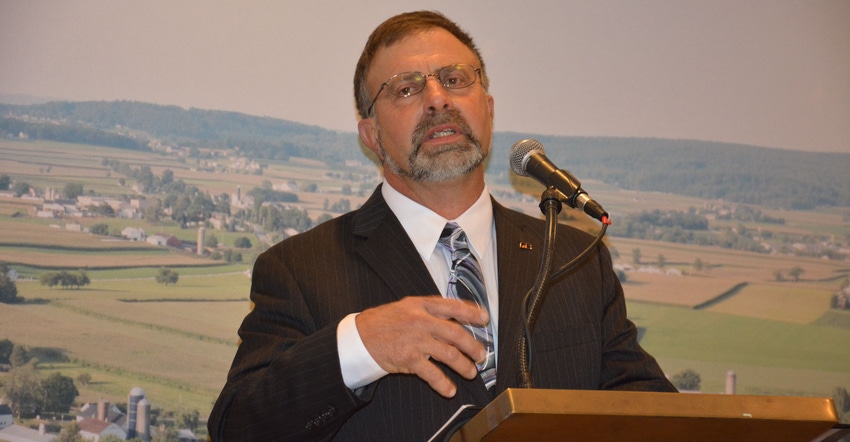
Rick Ebert has been farming full time for 36 years, but he's never seen a year like 2018.
"The perfect storm came together this year. We've had adverse weather conditions, low commodity prices and the trade wars," he says.
Ebert, who is a dairy farmer in western Pennsylvania, is also president of Pennsylvania Farm Bureau. He touched on the struggles farmers in the state are having during a recent visit with media at the organization's annual meeting in Hershey.
Ebert says farmers saw problems right away with delayed spring planting. The wet weather has drastically cut into hay cuttings, leading to likely feed shortages on many dairies.
"Those losses are real," he says.
Faster internet
One of the big issues Ebert says the organization will be pushing in 2019 is expanding rural broadband.
"For our farmers to compete in today's world, they need that technology both to get information and to market their products," he says. "And it also helps the whole rural community."
But building out rural broadband will be costly and time-consuming. The state announced earlier this year an initiative to provide up to $35 million in incentives for private companies to invest in rural broadband expansion.
Ebert says he'd like to see a system like rural electric cooperatives, of which there are 14 in the state. According to the Pennsylvania Rural Electric Association, the cooperatives serve 230,000 rural households and businesses.
Property tax reform will also be a priority for the new year. Ebert says the organization supports a complete elimination of property taxes in return for higher income and sales taxes to fund schools. He also says long-term pension reform would take the pressure off school districts to keep funding pension obligations, ultimately leading to higher taxes on property owners.
Hope for farm bill
When it comes to national issues, Ebert says the passage of a new five-year farm bill is the priority.
"We're very hopeful that it gets passed in the lame-duck session," he says. "If it doesn't, then all bets are off and it will likely be extended for an unknown period of time."
Extending it, though, would hurt farmers, he says, because farmers rely on crop insurance and other programs that are written into the five-year bill.
"We're hoping they don't even talk about extension. There is fixes in the new bill that we need," he says.
On trade, Ebert says U.S. soybean farmers have lost 97% of their market in China due to the ongoing trade dispute. Even though much of that impact is being felt in the Midwest and other areas where more soybean acres are grown, it's having trickle-down effect closer to home.
"When commodity prices fall, that affects our bottom line because our local soybean farmers have to take those commodity prices," he says. "The trade wars have really impacted Pennsylvania agriculture."
About the Author(s)
You May Also Like






